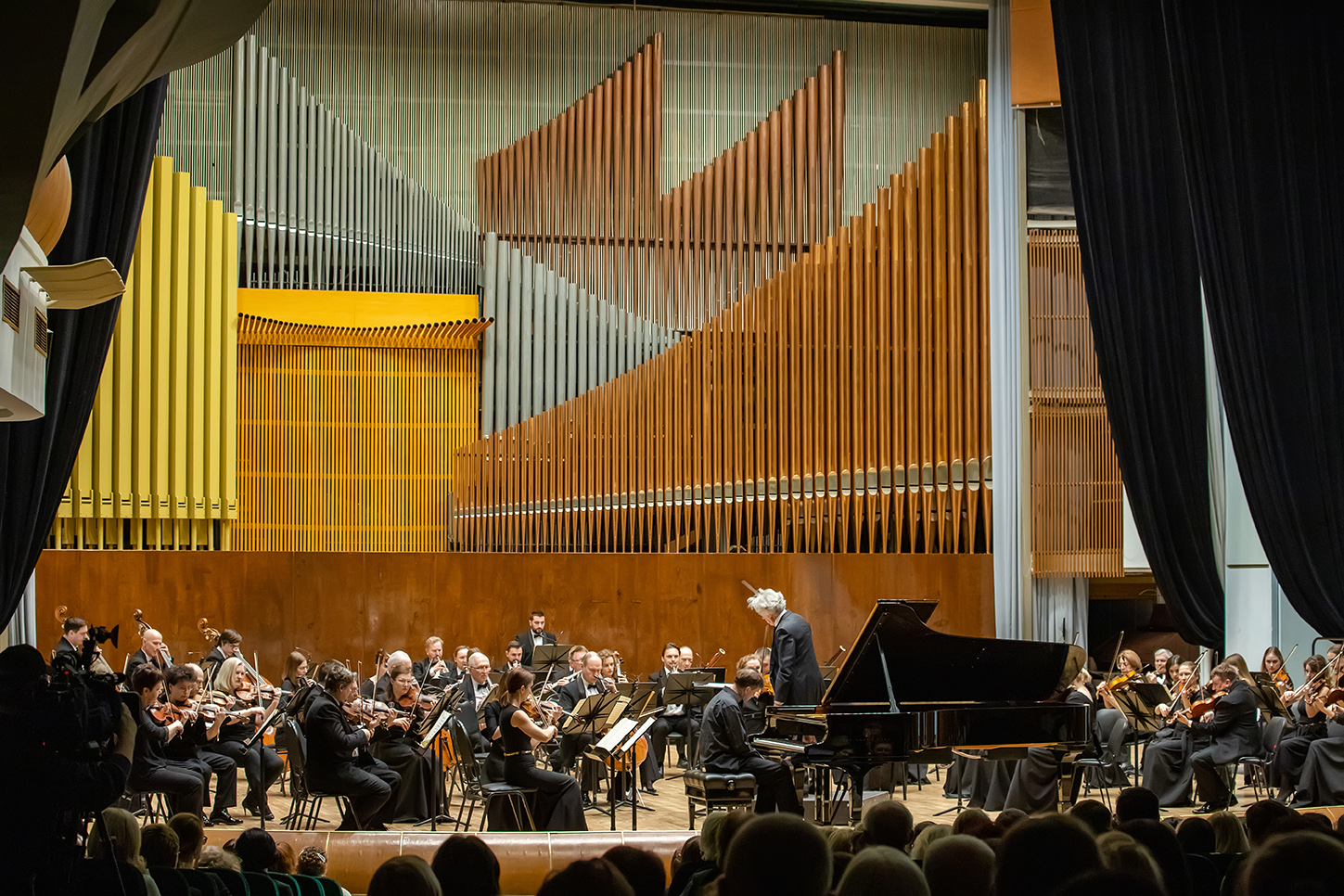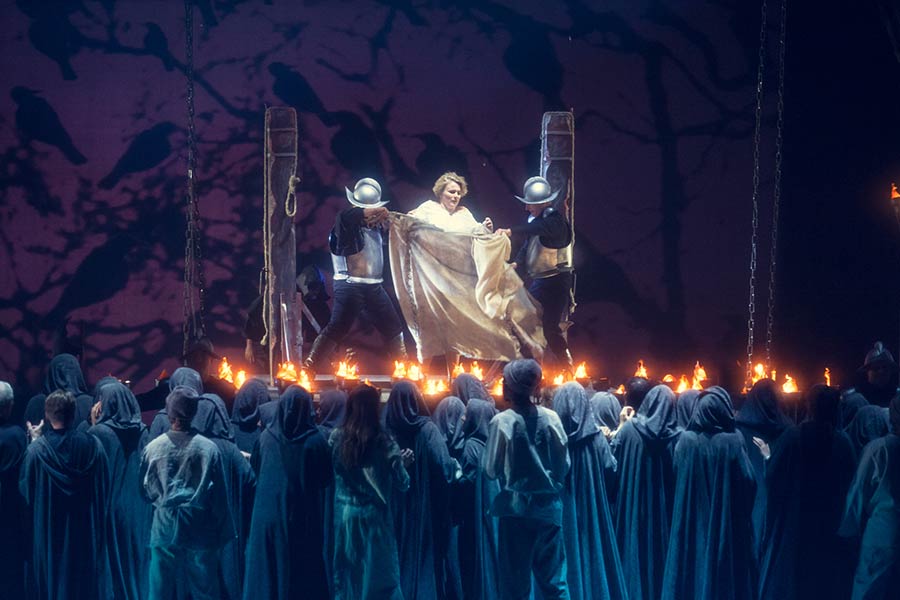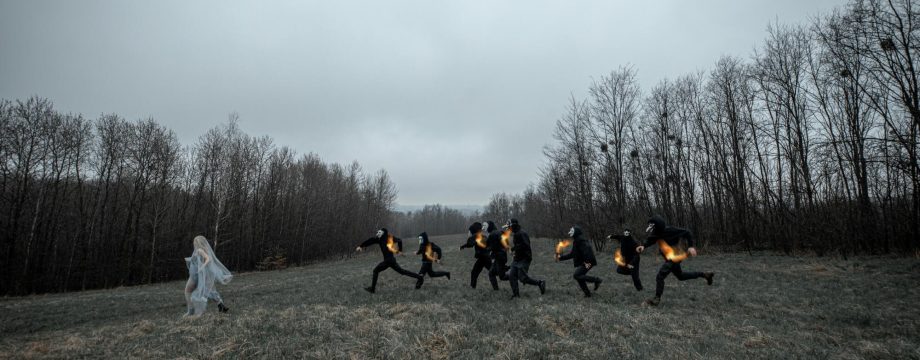Academic music as an art genre is a long-term phenomenon. Like little else, it requires maturity, perspective, broad horizons, connections, and intercultural communication. This involves relying on traditions, long-term specialized education of cultural figures, creators and performers, the formation of strong creative and performing schools, the preservation of musical material and recordings, and also constant work with the listener – long, gradual, and, of course, not cheap at all.
Such a system, closely connected with education, public opinion, related genres of art – first of all theatre and literature – is extremely important, because it embraces the intonational state of time, composes its “dictionary”, absorbs all the wealth of meanings, forms, harmonies, shapes of the musical “speech” of the people, crystallizes it. At the same time, it actually offers a universal, international and timeless language that allows one to instinctively correctly perceive – both on the intellectual and on the emotional, spiritual levels – the semantic series laid down by the author and performers, to de-tune from the stresses and challenges of everyday life, to gain the experience of empathy, sympathy and catharsis, to go beyond the usual.
Academic music as a system is based on social institutions – professional education, concert and theatre practice, the presence of state creative collectives according to the main genre directions. All of the above makes the sphere a fairly solid structure, but everything is not so simple. The branch exists at the intersection of contradictions, stereotypes and conflicts – both external and internal.
“Academic music is not for everyone”
Unfortunately, this opinion is popular in society. But it is wrong. It can be overcome only by more or less systematic promotion of the importance of academic art and music in particular, a gradual understanding of its unconditional and scientifically proven usefulness for the psychological health of the individual and the moral strength of society. In Belarus, this work has traditionally not been among the priorities.
Potential listeners often simply do not imagine the useful “therapeutic” qualities of academic music and in difficult times, they may first refuse to attend concerts, performances, and creative meetings where “classics” are played. At the same time, working with the listener is very fruitful, because the internal demand for solid, genuine, profound art exists, but the efforts here usually exceed the potential profit.
Positive movement is actually possible only under conditions of external financing, therefore in emigration such actions are of a project, individual nature. In Belarus the situation is completely different: listeners simply have no choice. Independent projects have been destroyed, private concert organizers remain “under surveillance”. It is not surprising that in Minsk now there is a fairly large number of visitors to academic concerts and performances. Another question is the real creative level of such a product in conditions of mass layoffs and repressions, as well as the quality and general orientation of the billboards of state concert institutions. But more on that later.
Dependence on personnel, disintegration and assimilation
Let us recall the experience of the Covid period (unfortunately, a global one): full shopping malls and empty concert halls. In the Belarusian case, the experience of emigration is also added to this – people are trying to restore their disrupted lives, guided primarily by considerations of survival, after which they consume light works, often of a nostalgic nature, as “spiritual food”. Of the musical trends at their peak, rock and popular music, represented mainly by the song genre. A significantly smaller number of emigrants go to local (Polish, German, Lithuanian, etc.) philharmonics and theatres for world classics.
The audience of Belarusian academic music itself (for all its importance), as well as its performers, is critically torn, fragmented between Belarus and emigrant communities. In Belarus, there are fewer and fewer opportunities to create and perform works of academic direction at a high level, there are no permanent groups abroad for this and there is no more or less localized audience. For all 30 years of “independence”, the state has not carried out any work to popularize national music outside the country, has not created organizations and communities of cultural influence, has not supported creators who emigrated and achieved significant success in the profession. There are hundreds of such names. Andrej Kavalinski – a trumpeter and a soloist of the Orchestre National de France, Arciom Šyškoŭ – a brilliant violinist, Michaił Lavončyk – a cymbalist and an arranger, Lavon Hurvič – a composer and a pianist, Hieorhij Sasnoŭski – a composer, Hanna Šybajeva – a pianist, Mikaeł Samsonaŭ, Alaksandr and Alaksiej Bahryncavy, Ivan Karyzna – cellists, Andrej Panačeŭny – a pianist and a professor at the Meadows School of the Arts, Juryj Hierman – a violinist and a concertmaster of one of the largest professional orchestras in China, Pavieł Piatroŭ – a singer who is in demand in major opera houses. All of them are the laureates of major world competitions – they perform concerts, teach and give master classes in Europe, America and China. All of them are just a few of the many talents that the state system simply wrote off.
We see the result today: the best Belarusian musicians continue to leave the country, but in the absence of permanent institutions, they assimilate into groups in other countries or conduct concert activities that are almost unrelated to Belarus or other Belarusians. We must understand that this process is inevitable in such a situation, and if a structure is not finally created to support the work of outstanding Belarusians – academic musicians, their assimilation – and this is most often a one-way path – will expand.
The weakness of conventional approaches
The sphere of academic music cannot be completely commercial. It has other, broader tasks, it is a basis, a cultural phenomenon, in practice it practically does not pay off. Even in developed countries, from half to 2/3 of the industry’s budgets are state subsidies, another important source is sponsorship. In the chain of creator – producer – state – performer – listener, the role of the state is extremely high, and in its absence, the state’s actual refusal of any subjectivity, Belarusian academic musicians in emigration cannot yet count on at least some degree of institutionalization.
Unlike pop and popular music, streaming, record sales, and other traditional show business measures do not save you financially here. Academic art exists to a large extent as direct contact between the performer and the listener, views and record sales work here only in the case of already widely known media names and works, and this is again more likely show business or the work of large booking agencies. The national approach, preservation of heritage, traditions, pre-orders for new works – practically do not function in business models.
The only possible approach is a project-based one, but it is by definition a one-off rather than a systemic one. The way out for Belarusian creators may be to join global chains and, through that, to preserve themselves.
Lack of constructive and professional criticism
The events of 2020 also led to the virtual destruction of independent media and purges in state-owned media. Journalists and musicologists who raised acute problems in their articles and allowed themselves to criticize the repertoire policy or the quality of premieres of state cultural institutions, were fired or exiled. Unprofessional individuals took their place, and now they openly flaunt their illiteracy in front of readers. Loyalty according to the “cuckoo praises the cockerel” model gradually became more than the norm – it’s the only possible form of existence now. Unfortunately, there is simply no music or music-theatre criticism in Belarus.
What is the current state of the Belarusian academic music scene?
In Belarus
According to traditional post-Soviet centralization, the main events in the field of academic music take place on the stages of state music and theatre institutions, which are also “bases” for the main professional creative groups, as well as soloists. Let’s take a closer look at the dynamics of events and changes over the past few years.
Belarusian State Philharmonic
At the main concert venue of the country in recent years, we have observed a clear and significant decline in the quality of the programme. The artistic level of the programmes, their ideas, titles, works – all this is gradually simplified, and sometimes even primitivized. Most of the programmes are mainly digest-like and designed for an undemanding listener. Alongside the truly interesting programmes of the State Chamber Orchestra (new names, unusual ideas, a wide repertoire, attractive design of the posters), the audience is offered an “Irish ragout” of popular songs for a symphony orchestra, tours of the Lugansk Theatre with a “rock opera” on a propaganda plot, student concerts, official programmes of a “military-patriotic” orientation. International isolation forces us to work on our own, there is no trace of the former diversity of performers and programmes. The invited soloists and groups are almost exclusively state-owned Russian ones.

In choral, symphonic and instrumental concerts, there is also a clear tendency towards Russian music. Premieres of works by Belarusian composers (mostly choral) have become isolated, sporadic phenomena. Moreover, these phenomena are almost never advertised separately, most likely due to the aggressive activities of informants and reinsurance on the part of the administration. Many prominent names of composers are under unofficial ban, there is accurate information about the departure of some of them from the profession and the difficult material and moral situation of those who cannot (yet) betray their calling.
The above mentioned resembles an attempt – conscious or not – to level the needs of the public and musicians in the performance of Belarusian music, to make its quantity insignificant, limited and controlled.
In general, to our great regret, the Belarusian State Philharmonic’s poster of recent times already resembles the posters of provincial Russian philharmonics, rather than the poster of a metropolitan concert organization of an independent country.
State Academic Musical Theatre
On the theatre stage – tours of Russian regional drama and musical theatres, Russian vaudevilles and musical comedies by Maxim Dunaevsky, Gleb Matveichuk, Alexei Rybnikov, Kim Breitburg, Georgy Gladkov and Evgeniy Ptichkin. In fact, the only Belarusian performance in the theatre’s repertoire is the ballet “Kupalle” by Lizavieta Łoban, staged by a choreographer Siarhiej Mikiel, the premiere of which took place in April 2025.
The National Academic Grand Opera and Ballet Theatre of the Republic of Belarus
In 4 years, this theatre has not hosted a single Belarusian premiere. Almost all of the so-called “premieres” are actually repetitions of works already in the theatre’s repertoire in other stage versions. The announced premiere of the 2024/25 season is again a Russian opera, “The Maid of Orleans” by Pyotr Tchaikovsky, which will also be staged by Russian specialists. It is worth noting that the director of the Grand Opera and Ballet Theatre, Kaciaryna Dułava, does not hesitate to talk about the need for an abridged edition of this opera – she means that Tchaikovsky’s full score is extremely difficult for the current theatre troupe.
By the way, an interesting fact: the Grand Opera and Ballet Theatre regularly recruits orchestra and ballet artists through advertisements on Instagram and other social networks. A few years ago, this would have been impossible to even imagine.
Existing “international” events and festivals are now almost exclusively Belarusian-Russian, and the festival “Evenings of the Grand Opera and Ballet Theatre in the Radzivił Castle” is actually becoming a tour of repertoire performances in Niasviž.
By the way, the repertoire of the “national” Grand Opera and Ballet Theatre includes only two Belarusian operas (“King Stakh’s Wild Hunt” by Uładzimir Sołtan and “The Grey Legend” by Dźmitryj Smolski) and no Belarusian ballet.

General conditions for all musical groups
The repertoire is shrinking and becoming primitive. The posters feature lots of Russian figures who support the war in Ukraine (the most famous of them are Sergei Raldugin, Denis Matsuev and Yuri Bashmet), military propaganda concerts and performances. There is a severe shortage of qualified personnel everywhere and there are a lot of vacancies. But purges and dismissals for political reasons continue, and each dismissal means the impossibility for a particular musician, dancer or singer, whose professional training period is 15-20 years, to continue their professional activities at home.
In recent years, hundreds of musicians, dancers, and singers from all creative groups in Belarus have left for Europe, the USA, China and other countries in search of work, without exaggeration. This is especially true for Minsk, where the blow is most serious – in fact, experienced creative personnel have been “knocked out”. And if we consider that most of the dismissed musicians also taught at colleges, art schools, and universities, and participated in independent projects, it is even difficult to assess more or less accurately the scale of the long-term damage that the regime has inflicted on academic music. The situation is unfolding gradually, but every year a full-fledged cultural catastrophe is becoming more and more obvious – there are fewer and fewer people who can pass on knowledge, skills and traditions.
Repression also reigns in higher and secondary specialized educational institutions, and a number of star teachers have been fired. Students are deprived of the opportunity to receive a quality education, moreover, in addition to the mandatory competition for a professional creative team, a “sieve” of checks by special services has now been added. Often, the most talented and bright are denied a government job because of a carelessly written comment or a rated “like” years ago, after which they are forced to either change their profession or leave Belarus.
“Negative selection” has been operating for years, it is gradually but steadily destroying the system of professional creative groups in the country as well as academic music education, consistently and inevitably lowering the level and creative bar of existing groups, narrowing their opportunities. But most importantly, it reduces the likelihood of a full-fledged revival of performing arts schools in the future, making the dependence on “touring performers from the metropolis” significant.
Today, the musical directors of the three main orchestras of Belarus are Russians. In the Philharmonic, these are Alexander Anisimov and Evgeny Bushkov. In the Grand Opera and Ballet Theatre it’s Artem Makarov. Mass dismissals of active professional conductors have already led to a lack of creative personnel who would be able to determine the fate and direction of the leading academic ensembles. A striking example: 5 out of 6 experienced conductors have been dismissed from the Grand Opera and Ballet Theatre: Viačasłaŭ Čarnucha-Volič (holds the position of chief conductor of the Bolshoi Theatre of Opera and Ballet in Tashkent), Andrej Hałanaŭ, Ivan Kaściachin, Aleh Lasun and Dźmitryj Matvijenka (all of them work in Europe).
Increasingly, artistic directors of creative groups, even those in the capital, are becoming people without specialized education – this is the “Presidential” orchestra (Vital Kulbakoŭ), the state brass band “Niamiha” (Aleh Hiembicki), the ensemble of soloists “Classic-avant-garde” (Ludmiła Kalinoŭskaja), and student creative groups – sources of future personnel for concert organizations.
The system’s desire to put on a good face while playing badly logically leads to appointments to leadership positions of ideologically seasoned amateurs.
In exile
The social habit of the constant work of poor but stable formerly state-owned collectives in a situation of forced emigration plays not only against musicians. It is not in favour of the potential audience either. If a request is formed for the usual needs of pop listeners, and thus an artistic offer, then the voiced need from the academic listener is clearly not enough. We also considered the reasons above – these are habits like “classics are not for everyone”, as well as the presence of their own concert organizations in the countries that host the majority of Belarusian emigrants.
In the best case scenario, Belarusian emigrant musicians strive to work there, in others they leave the profession or earn money through private lessons and requests. This is directly related to a whole range of problems:
- the lack of truly Belarusian management in this area;
- lack of resources to support artists in exile, at least until the artist is able to earn a living professionally on their own;
- the virtual lack of interest from the media in the initiatives and activities of academic artists.
The focus is on clickbait, so news about musical culture mainly concerns the pop scene, often not even Belarusian, but Russian. We are also aware of cases when artists who turn to Belarusian independent media are offered information about the difficult situation they are in instead of positive news about a new project.
In fact, the same situation prevails in emigration as in Belarus, where commercial rock festivals have had and still have great interest from the media, while academic art and cultural heritage itself have traditionally been somewhere on the periphery of media attention. Meanwhile, just as the existence of the scientific community is impossible without fundamental science, so is the existence of a conscious Belarusian society in the future without all possible support for the sphere of academic culture – on the media, project, sponsorship, influential-political, value-based, institutional levels – impossible. The musical part of this sphere is not only quite expensive and complex, but also one of the most vulnerable. The survival experience that academic cultural figures gain here and now will certainly be useful if forced assimilation doesn’t become irreversible.
Names, events, communities, individual projects
Of course, even in the current conditions, there are still figures, initiatives and groups on both sides of the border who are looking for new forms of existence, generating ideas, trying to establish a dialogue with the audience and expand it. Interesting, subtle, high-quality projects are being organized by the soloists of the Bolshoi Opera Theatre, Juryj Haradziecki and Taćciana Haŭryłava, and the wind instrument quintet, where musicians from the same theatre play, is doing an excellent job. But these are only occasional concerts, large-scale high-quality non-state events with a humanistic-national orientation like the “Classics near the Town Hall” festivals are no longer there, and there is no state replacement for them either. Narratives of preserving the heritage, revealing its treasures, including Belarus and its academic music in the European context, as well as any aspiration to think about the future, are effectively banned. The 30-year activity of the “Belarusian Capella” led by Viktar Skorabahataŭ has been stopped. The same applies to the early music ensemble “Cantabile”, whose members are in forced emigration. The founder of the Music House “Classica” Alaksandr Čachoŭski is also in exile.
In emigration, where only single creative projects are currently possible, great research and pedagogical work is being carried out by choirmasters: Halina Kazimiroŭskaja, Pavieł Honca and Pavieł Sopat. Opera singers Natalla Akinina and Illa Silčukoŭ are slowly returning to concert and teaching activities. Rehina Sarkisava, Uładzimir Sudnoŭski, Jaŭhien Vidanaŭ, Stanisłaŭ Pietčanka, Jelizavieta Hiembickaja, and other outstanding Belarusian musicians who were dismissed from the Grand Opera and Ballet Theatre, the Philharmonic Society, and the Republican College of Arts are actively working in Lithuania.
The “Yellow Stars” festival with the participation of Belarusian musicians took place in Montenegro, organized by Hanna Lańkova. The young talented conductor Dźmitryj Matvijenka and his wife, singer Nadzieja Kučar, are successfully working in Europe. The dismissed conductor of the Grand Opera and Ballet Theatre, Ivan Kaściachin, carried out a unique work on the restoration of the score of the epic-dramatic opera “Margera” by Kanstancin Horski, destroyed by the war. By the way, he, in collaboration with more than 20 Belarusian musicians on both sides of the border, recorded the project “Hidden place. Secret Life”, dedicated to the desolation and the disintegration of the common Home of Belarusians – Belarus itself. In London, the premiere of Volha Padhajskaja’s opera “King Stakh’s Wild Hunt” in the production of the Belarusian Free Theatre with the participation of Belarusian and Ukrainian singers successfully took place.



Only the most notable recent events are listed above. This is the very beginning of “life anew” – and in incredibly difficult conditions Belarusians are already doing worthy things. In cooperation with those Belarusian musicians who have long lived, worked and are known in Europe, with the understanding of themselves as part of the world artistic community, Belarusians have a real chance to both preserve themselves and successfully move forward.
A lot of work – organizational and creative – awaits us ahead.



